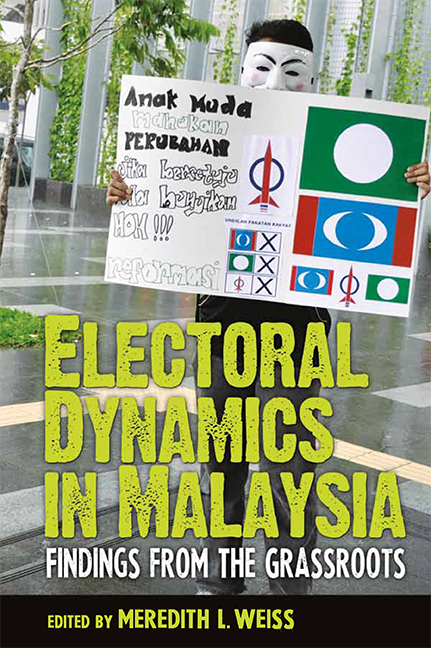Book contents
- Frontmatter
- Contents
- List of Tables
- Foreword
- Acknowledgements
- Glossary & Acronyms
- Chapter 1 Introduction: Patterns and Puzzles in Malaysian Electoral Dynamics
- Chapter 2 Arau, Perlis: The Irresistible Charm of Warlords, Women and Rewards?
- Chapter 3 Padang Serai, Kedah: Between the ‘Personal Touch’ and the Generous Hand
- Chapter 4 Kuala Nerus, Terengganu: New Malay Politics?
- Chapter 5 Balik Pulau, Penang: Home Run for the Home Boys
- Chapter 6 Lumut, Perak: Patronage, Clientelism and the Post-Coup Order
- Chapter 7 Kuantan, Pahang: Revealing the Ordinary
- Chapter 8 Pandan, Selangor: New Electoral Dynamics in Urban Malaysia
- Chapter 9 Kepong and Titiwangsa, Kuala Lumpur: Messages or Money?
- Chapter 10 Rembau, Negeri Sembilan: Personalities and Promises
- Chapter 11 Pulai, Johor: A Tale of Two Coalitions
- Chapter 12 Gelang Patah, Johor: Did Lim Kit Siang Truly Win His Last Gamble?
- Chapter 13 Kota Marudu and Keningau, Sabah: Personality, Patronage and Parochial Politics
- Chapter 14 Tuaran, Sabah: Party Loyalty and Rational Voting
- Chapter 15 Kota Kinabalu, Sabah: BN Loses Its ‘Fixed Deposit’
- Chapter 16 Beaufort, Sabah: Whither Lajim's Popularity?
- Chapter 17 Sibu and Lanang, Sarawak: Defeat of the Bosses
- Contributors
Chapter 14 - Tuaran, Sabah: Party Loyalty and Rational Voting
Published online by Cambridge University Press: 10 November 2017
- Frontmatter
- Contents
- List of Tables
- Foreword
- Acknowledgements
- Glossary & Acronyms
- Chapter 1 Introduction: Patterns and Puzzles in Malaysian Electoral Dynamics
- Chapter 2 Arau, Perlis: The Irresistible Charm of Warlords, Women and Rewards?
- Chapter 3 Padang Serai, Kedah: Between the ‘Personal Touch’ and the Generous Hand
- Chapter 4 Kuala Nerus, Terengganu: New Malay Politics?
- Chapter 5 Balik Pulau, Penang: Home Run for the Home Boys
- Chapter 6 Lumut, Perak: Patronage, Clientelism and the Post-Coup Order
- Chapter 7 Kuantan, Pahang: Revealing the Ordinary
- Chapter 8 Pandan, Selangor: New Electoral Dynamics in Urban Malaysia
- Chapter 9 Kepong and Titiwangsa, Kuala Lumpur: Messages or Money?
- Chapter 10 Rembau, Negeri Sembilan: Personalities and Promises
- Chapter 11 Pulai, Johor: A Tale of Two Coalitions
- Chapter 12 Gelang Patah, Johor: Did Lim Kit Siang Truly Win His Last Gamble?
- Chapter 13 Kota Marudu and Keningau, Sabah: Personality, Patronage and Parochial Politics
- Chapter 14 Tuaran, Sabah: Party Loyalty and Rational Voting
- Chapter 15 Kota Kinabalu, Sabah: BN Loses Its ‘Fixed Deposit’
- Chapter 16 Beaufort, Sabah: Whither Lajim's Popularity?
- Chapter 17 Sibu and Lanang, Sarawak: Defeat of the Bosses
- Contributors
Summary
Introduction
The Tuaran parliamentary constituency, located about 30 kilometres from Kota Kinabalu in Sabah, includes the three state legislative assembly constituencies of Tamparuli, Sulaman and Kiulu. Barisan Nasional (BN) won the parliamentary seat as well as two of the state seats, while Pakatan Rakyat (Pakatan) won one state seat. The Tuaran parliamentary seat had been identified before the 2013 election as a ‘hot seat’, as the fall of the Tamparuli state seat to the opposition and the narrow win of BN in Kiulu testify it was.
According to the 2010 census, Tuaran has 105,435 inhabitants, predominantly Bumiputera. Half the 48,276 registered voters in the Tuaran parliamentary constituency are non-Muslim Bumiputera, mostly Kadazandusun; most of the rest are Muslim Bumiputera, mainly Bajau.
The Kadazandusun had chosen BN in the last two general elections in Tuaran, but many voted for Parti Keadilan Rakyat (PKR), from Pakatan Rakyat, this time. PKR captured Tamparuli and very narrowly lost in Kiulu only because a significant number of Kadazandusun voters in the constituency opted to vote for the State Reform Party (STAR). Although PKR also lost the Tuaran parliamentary seat, it obtained about 85 per cent of the total non-BN votes there. Muslim Bumiputera voters' party loyalty toward BN, intraparty rivalries and PKR candidate Datuk Wilfred Bumburing's lack of rapport with the people contributed to his defeat. Lastly, the mostly Muslim Bumiputera voters in the Sulaman state constituency also overwhelmingly supported BN due to a combination of Datuk Hajiji Noor's leadership qualities and the same party loyalty. Thus, the 2013 Tuaran election results can be best explained in terms of parties, although with local dynamics in each constituency: long-established loyalty to the BN, on the one hand, based especially on a record of targeted development and assistance, and rivalries within and among the BN's opponents, on the other hand, suggest why the status quo has been so resistant to change, even among those voters open to a new alternative.
- Type
- Chapter
- Information
- Electoral Dynamics in MalaysiaFindings from the Grassroots, pp. 197 - 208Publisher: ISEAS–Yusof Ishak InstitutePrint publication year: 2013

